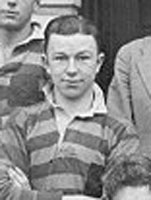On 30th October 1942 this 102 Squadron aircraft was to be ferried to another unit. At 10.37hrs the aircraft was taking off from Pocklington airfield when the aircraft began to swing off the runway to port, the pilot overcorrected the swing and it swung to starboard. The pilot attempted to reduce power to the engines but friction locked the throttle controls open. The aircraft left the runway and it ran onto soft ground where the undercarriage collapsed.
Pilot - Sgt Brian John Ketchell RAFVR (1155502).
Halifax DT518 had a brief but eventful service history. It was built to contract B.982938/39 by English Electric Co.Ltd. at Samlesbury. On 19th September 1942 it was taken on charge by 102 Squadron at Pocklington. It sustained minor damage by a lightning strike on 5th October 1942. The damage was very minor and assessed as being Cat.A/FB and was repaired on site. On 15th October 1942 it sustained flak damage, Cat.A/FB damage was again the assessment and it was again repaired on site. On 30th October 1942 it swung off the runway on take off from Pocklington resulting in the undercarriage collapsing. The aircraft was again assessed but this time the damage was too great to warrant a repair. Cat.E2/FA damage was the assessment and it was struck off charge. It had clocked up a total of 26 hours flying hours in the weeks it existed.
Brian Ketchell and his then crew were killed on 8th / 9th December 1942 on a mine laying flight in Halifax W7925, the aircraft crashed into the sea and only two bodies were ever found. Sgt Ketchell was twenty three years old, his body was never found and he is commemorated on the Runnymede Memorial. It is possible that his then crew was with him when this incident occurred at Pocklington though no record of this has yet been found by me.

Brian "Tim" Ketchell attended Lewes County Grammar School, Sussex between 1930 and 1938 rising to become Prefect and also School Captain. Known as "Tim" he was clearly a very clever young man. His school magazine (now available on the school website displaying back-issues and photographs) wrote about him failing to retun from Turin and spoke of him very favourably, the magazine stated that... "at the time of going to press, there is no news of Tim Ketchell, who has been missing for some weeks after a raid on Turin. To write about Ketchell is to write about the School during the first eight years of its existence." "He came to us in 1930 as a Junior Scholar. Before he left he had captained the School, won his Rugger Colours, passed his School and Higher School Certificate and sealed his academic record by success in the highly competitive examination for Executive Officers in the Civil Service. He had also won the Povey Trophy the highest award the School has to offer. After leaving school he was a valued forward in the Lewes Rugby Club and he also played for his R.A.F. Wing at rugger - a sufficient testimony to his football abilities. His influence in the School was undoubtedly great. A sound fellow with level-headed and mature views for one so young he could not fail to exercise a great influence for good. Perhaps those who knew him best will remember most vividly his activities in the VIth Form Society, where his sturdy expression of opinion soon brought to earth the purveyor of impracticable fancies and hot air. Those who taught him will also think of his tremendous industry especially when working for the civil service examination. He knew that his object could only be achieved by a supreme effort. He was determined to succeed and succeed he did. When once he had completed his operational training, he very quickly became Captain of a Halifax bomber. His qualities were such that he could not have failed, with reasonable luck, to have gone far in the R.A.F. His last visit to School, only a few weeks before he was reported missing, has left memories of a modest, but very capable and determined pilot whose like the School is proud to claim as alumni. We shall still hope that he may be safe."